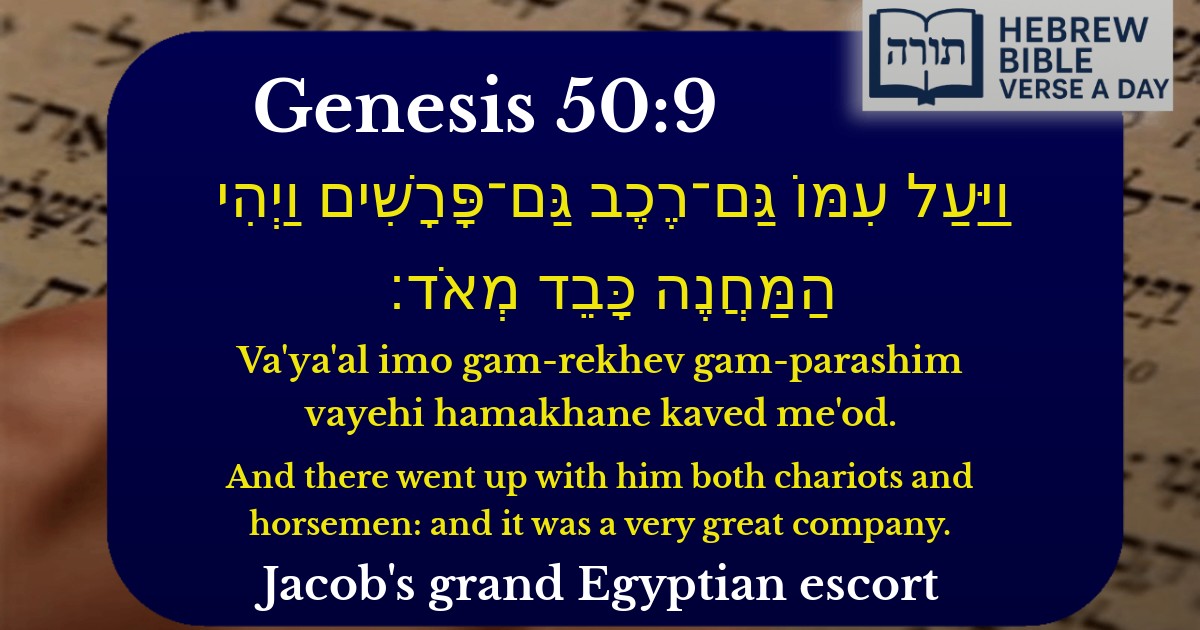Frequently Asked Questions
Q: What does Genesis 50:9 mean when it describes the large group that went with Joseph?
A: This verse describes the large and honorable procession that accompanied Joseph when he went to bury his father Jacob in Canaan. According to Rashi, the 'chariots and horsemen' refer to Egyptian officials and military escorts sent by Pharaoh, showing great respect for Joseph and his family. The 'very great company' emphasizes the importance and dignity of the burial procession.
Q: Why was such a large group sent with Joseph to bury Jacob?
A: The large escort, including Egyptian officials and soldiers, was a sign of honor for Jacob (Yaakov) and respect for Joseph (Yosef), who was highly esteemed in Egypt. The Midrash explains that this fulfilled Jacob's prophecy that his descendants would return to Canaan, even if temporarily for burial. It also demonstrated that even non-Jews recognized the greatness of the righteous.
Q: What lesson can we learn from Genesis 50:9 about honoring parents?
A: This verse teaches the importance of honoring one's parents even after their passing. Joseph, as a high-ranking official, could have delegated the burial, but he personally accompanied his father's body with great honor. The Rambam (Hilchot Avel 14:1) derives from this the mitzvah of honoring parents in death as in life, showing that respect does not end with their passing.
Q: How does the Torah show that Jacob was respected by non-Jews?
A: The fact that Pharaoh sent Egyptian chariots and horsemen - a royal escort - demonstrates that even the Egyptians recognized Jacob's greatness. The Talmud (Megillah 16b) notes that sometimes the righteous are honored by non-Jews, which brings honor to Hashem's name. This public honor helped establish the importance of Jacob's family in Egypt.
Q: Why does the Torah emphasize that the company was 'very great'?
A: The emphasis on the size of the procession ('very great company') serves multiple purposes: 1) It shows the fulfillment of G-d's promise that Jacob's descendants would be numerous, 2) It demonstrates the transition from Jacob being a single individual to becoming the ancestor of a great nation, and 3) It highlights how even in exile, the Jewish people maintained their dignity, as explained in various Midrashic sources.


Context in the Torah
The verse (Bereshit 50:9) describes the procession accompanying Yaakov Avinu's burial in the Cave of Machpelah. This event occurs after Yosef secures Pharaoh's permission to bury his father in Eretz Yisrael. The "very great company" reflects the honor accorded to Yaakov.
Rashi's Explanation
Rashi (Bereshit 50:9) notes that the term "רֶכֶב" (chariots) refers to Egyptian nobility, while "פָּרָשִׁים" (horsemen) denotes military officers. The presence of both demonstrates the high regard in which Yaakov was held, as Pharaoh sent his most distinguished officials.
Midrashic Insights
Rambam's Perspective
In Hilchos Aveil 14:1, the Rambam derives from this verse the halachic principle of "כבוד המת" (honoring the deceased). The extensive Egyptian escort demonstrates that even non-Jews recognized the importance of honoring the righteous, setting a precedent for Jewish burial customs.
Symbolic Interpretation
The Kli Yakar (Bereshit 50:9) explains that the chariots and horsemen represent different aspects of Yaakov's legacy: